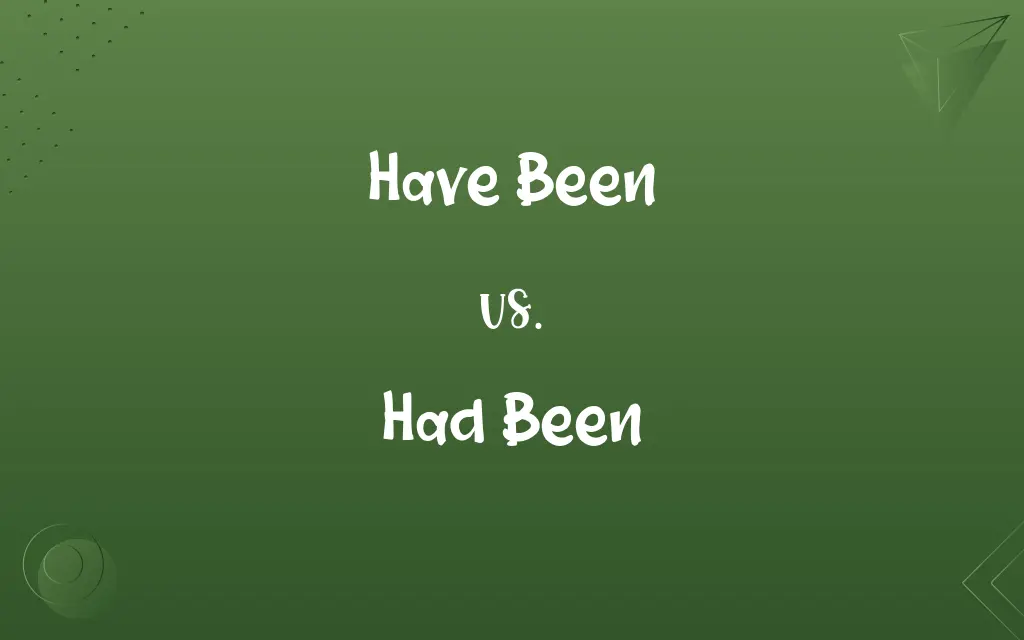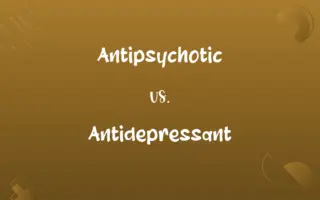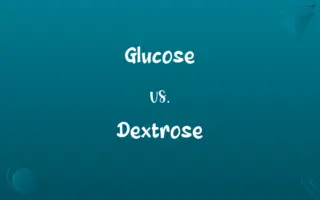Have Been vs. Had Been: Know the Difference

By Shumaila Saeed || Published on January 14, 2024
"Have been" is present perfect tense indicating an action started in the past and may continue to the present, while "had been" is past perfect tense for actions completed before another past event.

Key Differences
Have been is used in the present perfect tense to describe an action that started in the past and continues into the present, or whose effects are still felt. It connects the past with the present. Had been, however, is used in the past perfect tense to indicate an action that was completed in the past before another past action occurred. This difference highlights the temporal relationship between the action and the reference point.
Shumaila Saeed
Jan 14, 2024
In terms of usage, have been often appears in sentences that discuss experiences, changes over time, or ongoing situations. It suggests continuity or repetition. On the other hand, had been typically appears in more complex sentences that require expressing a sequence of events in the past, indicating that one event happened before another.
Shumaila Saeed
Jan 14, 2024
Have been can also be used to describe general experiences up to the present. For example, "I have been to France" implies the experience occurred at some unspecified time before now. In contrast, had been emphasizes completion before a specific moment in the past, as in "I had been to France before 2010", indicating the visits occurred before that year.
Shumaila Saeed
Jan 14, 2024
Another aspect is the implication of duration. Have been can imply a sense of duration continuing up to the present. For instance, "I have been waiting for hours" suggests the wait started in the past and is still ongoing. Had been suggests a duration that had a definite endpoint in the past, such as in "I had been waiting for hours before he finally arrived."
Shumaila Saeed
Jan 14, 2024
Finally, the choice between have been and had been can change the meaning of a sentence. Using have been can suggest relevance to the current situation, while had been can imply that the situation has changed. For instance, "I have been sick" suggests you might still be unwell, whereas "I had been sick" implies you have since recovered.
Shumaila Saeed
Jan 14, 2024
ADVERTISEMENT
Comparison Chart
Usage Context
Current relevance, experiences, changes
Sequence of past events, completed actions
Shumaila Saeed
Jan 14, 2024
Example
"I have been studying."
"I had been studying before the test started."
Shumaila Saeed
Jan 14, 2024
ADVERTISEMENT
Have Been and Had Been Definitions
Have Been
Describes actions that were completed in the recent past.
I have been reading that book.
Shumaila Saeed
Dec 19, 2023
Had Been
Describes a state or condition that existed in the past.
They had been happy together.
Shumaila Saeed
Dec 19, 2023
Have Been
Describes a general state or condition over a period of time.
I have been tired lately.
Shumaila Saeed
Dec 19, 2023
Had Been
Indicates the duration of an action leading up to a specific time in the past.
She had been waiting for an hour when he arrived.
Shumaila Saeed
Dec 19, 2023
Have Been
Indicates experiences acquired over a lifetime.
I have been to several countries.
Shumaila Saeed
Dec 19, 2023
ADVERTISEMENT
Had Been
Used to show the sequence of two past actions.
He had been sleeping when the phone rang.
Shumaila Saeed
Dec 19, 2023
Have Been
Indicates how something has changed or developed over time.
The climate has been changing.
Shumaila Saeed
Dec 19, 2023
Had Been
Indicates an action that was completed in the past before another past action.
I had been working there before it closed down.
Shumaila Saeed
Dec 19, 2023
Have Been
Refers to actions that started in the past and continue to the present.
I have been working here for five years.
Shumaila Saeed
Dec 19, 2023
Had Been
Refers to a habit or repeated action that occurred in the past.
We had been going to that café every Sunday.
Shumaila Saeed
Dec 19, 2023
Repeatedly Asked Queries
What does "have been" imply in a sentence?
It implies an action or state that started in the past and may continue to the present.
Shumaila Saeed
Jan 14, 2024
Can "have been" be used for recent actions?
Yes, it can describe actions completed in the recent past and still relevant.
Shumaila Saeed
Jan 14, 2024
How does "have been" connect past and present?
It shows an action or state that started in the past and has implications for the present.
Shumaila Saeed
Jan 14, 2024
When should I use "had been"?
Use "had been" to indicate a past action that was completed before another action in the past.
Shumaila Saeed
Jan 14, 2024
Does "had been" imply a sequence of events?
Yes, it's used to show that one past event happened before another.
Shumaila Saeed
Jan 14, 2024
How do I know when to use "have been" or "had been"?
Use “have been” for actions relevant to the present and “had been” for past completed actions.
Shumaila Saeed
Jan 14, 2024
What's the difference in time reference between "have been" and "had been"?
“Have been” spans from past to present, while “had been” refers to a time before another past event.
Shumaila Saeed
Jan 14, 2024
Is "had been" only for past events?
Yes, it's used to describe actions or states that were completed in the past.
Shumaila Saeed
Jan 14, 2024
Can "have been" indicate life experiences?
Yes, it's often used to talk about life experiences up to the present.
Shumaila Saeed
Jan 14, 2024
What tense is "have been" a part of?
It's part of the present perfect tense.
Shumaila Saeed
Jan 14, 2024
Can "have been" describe changes over time?
Yes, it can indicate how things have changed or developed over time.
Shumaila Saeed
Jan 14, 2024
Does "have been" suggest continuity?
Yes, it often suggests an action or state is continuing or has recent relevance.
Shumaila Saeed
Jan 14, 2024
Is "have been" suitable for ongoing situations?
Yes, it's ideal for describing ongoing actions or states.
Shumaila Saeed
Jan 14, 2024
What kind of actions does "had been" describe?
It describes completed actions or states in the past, often before another past event.
Shumaila Saeed
Jan 14, 2024
Can "had been" describe past habits?
Yes, it can describe habits or repeated actions in the past.
Shumaila Saeed
Jan 14, 2024
How does "have been" differ in meaning from "had been"?
“Have been” connects past actions to the present, while “had been” shows completion before another past event.
Shumaila Saeed
Jan 14, 2024
What does "have been" tell us about duration?
It can indicate an ongoing or extended duration up to the present.
Shumaila Saeed
Jan 14, 2024
Is "had been" used for past conditions?
Yes, it can describe past conditions or states that existed before a specific point in the past.
Shumaila Saeed
Jan 14, 2024
And what tense does "had been" belong to?
It belongs to the past perfect tense.
Shumaila Saeed
Jan 14, 2024
Can "have been" be used for general states?
Yes, it's often used to describe general states or conditions over a period.
Shumaila Saeed
Jan 14, 2024
Share this page
Link for your blog / website
HTML
Link to share via messenger
About Author
Written by
Shumaila SaeedShumaila Saeed, an expert content creator with 6 years of experience, specializes in distilling complex topics into easily digestible comparisons, shining a light on the nuances that both inform and educate readers with clarity and accuracy.








































































